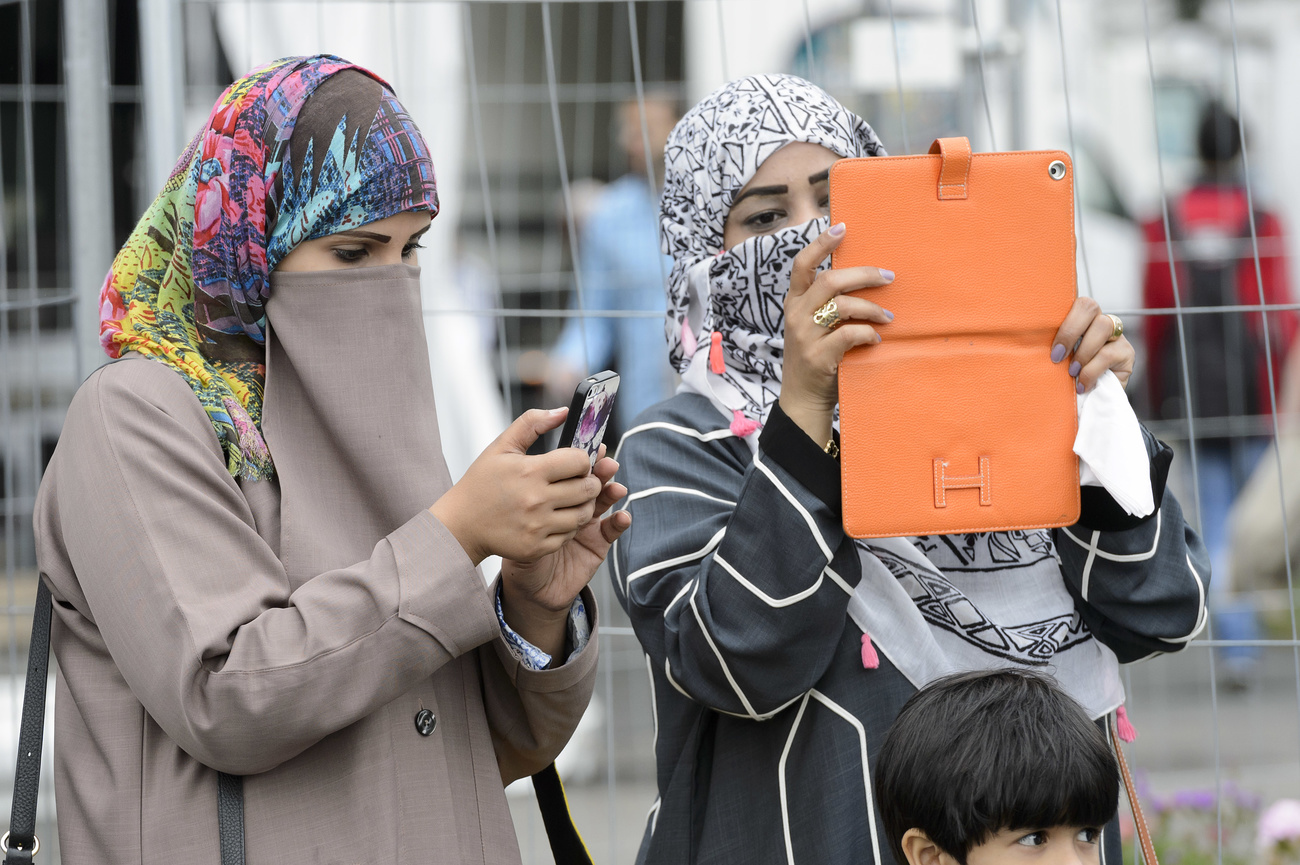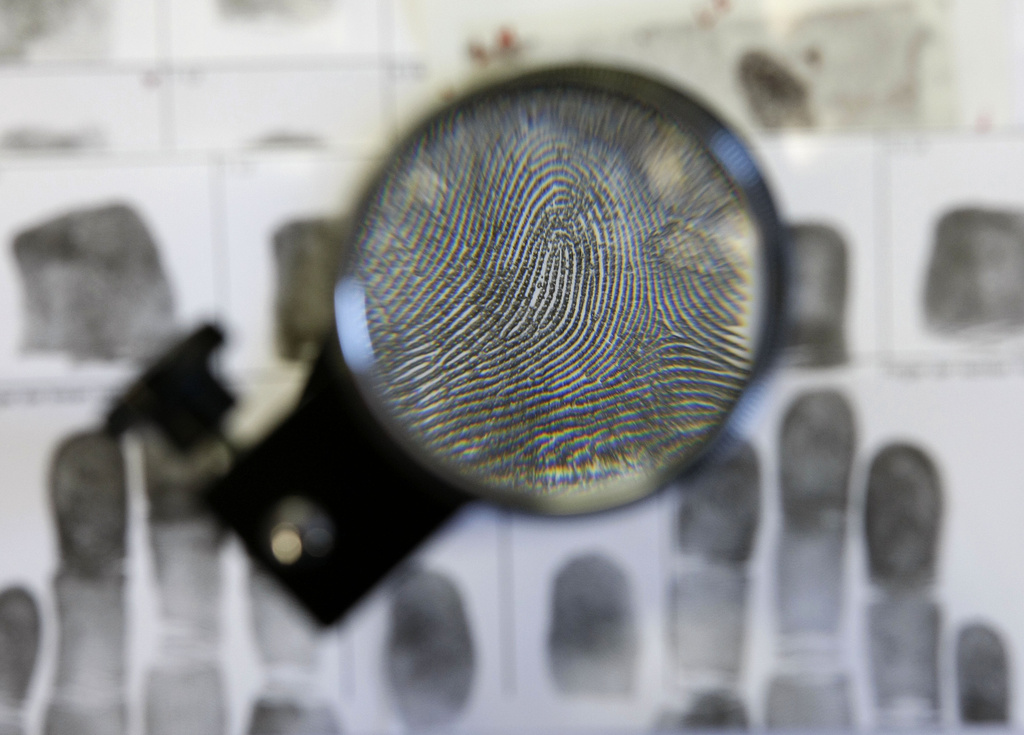Burka ban campaigners lose ground ahead of vote

Support for a proposed ban on facial coverings, including burkas, in Switzerland appears to be on the wane according to a new opinion poll.
A law on a licensed electronic ID scheme looks set to fail, while a controversial free trade accord with Indonesia is likely to win approval in a set of nationwide votes on March 7.
The poll, carried out by the GfS Bern research institute in mid-February, was commissioned by the Swiss Broadcasting Corporation (SBC), swissinfo.ch’s parent company.
Support dwindling
Opponents of the right-wing initiative, which aims to ban full facial coverings in public, now trail backers by just 2%, compared with the 16% announced by the SBC poll a month ago.
The gains are the result of waning support among women, the younger generation, citizens in urban regions and higher income earners, said Martina Mousson, political scientist at GfS Bern.
The initiative has also lost ground in the French-speaking region of the country and to a lesser extent in the main German-speaking region.
A 58% majority of Swiss expat respondents is still in favour of the initiative, down from 74% a month earlier. Pollsters have no clear idea why voters living outside Switzerland seem more inclined to approve the proposed ban.
Overall, “there is a clear trend towards rejection, despite the relative majority in favour of the initiative at the moment,” said Mousson. “There are no signs that this trend will be easily reversed.”
However, she didn’t rule out an approval of the initiative, especially if a populist right-wing campaign manages to whip up enough emotions in the run-up to voting day, drawing scores of government critics to the polling booths.
The last right-wing initiative to win a majority dates back to 2014. People’s initiatives – launched by collecting 100,000 signatures – are rarely accepted by voters in Switzerland. Another notable exception includes the right-wing proposal to ban the construction of new minarets approved by voters in 2009.
Mousson said many respondents to the survey felt there was no need for an outright ban, since face coverings worn by hooligans or demonstrators are already outlawed in many Swiss regions.
For their part, supporters of the ban argue that it is against Switzerland’s culture and traditions to hide one’s face in public.
Whether or not the ban would help Muslim women claim their rights in a patriarchal environment remains unclear, according to Mousson. “It seems difficult to draw a clear line. There are conflicting opinions among women even in left-wing parties,” she says.
The initiative is supported mainly by right-wing groups, but most political parties, parliament and the government have come out against it.
Doubts over eID
The introduction of a certified verification method for a digital identity, or single access point for online services provided by a range of public and private sectors, is poised to fail.
“Doubts over the practical use of the eID and its legal basis are overwhelming,” said Lukas Golder, co-director of the GfS Bern research institute.
He said it was surprising to see how the tide had turned against the law, which was approved by parliament in 2019. “Such a trend can no longer be stopped under normal circumstances.”
Scepticism about the role of private companies as possible providers of the digital ID, as well as concerns about possible data abuse, are decisive factors.
Golder also pointed out that the relative complexity of the issue at stake meant that a clear and comprehensive discussions was difficult for the public.
The eID law was challenged to a nationwide vote by an alliance of citizen’s rights groups and democracy activists supported by left-wing and some centrist parties. They argue that the role of the state should not be limited to simply licensing and controlling the eID, but that the state should also provide the system.
Polarisation
Despite a likely defeat for the digital identity, the government and parliament can hope to win a vote on a controversial trade accord with Indonesia, challenged by anti-globalisation critics and left-wing parties.
Support for the trade deal has remained stable, even if opponents have slightly reduced the gap, the latest poll found.
“There’s been a growing polarization and citizens close to centrist and centre-right parties will make the difference,” said Golder.
He added that a rejection of the law on environmental and ethical grounds is not excluded on March 7, but that the chances of it being approved are higher.
Barring unforeseen events in the final days of the campaign, the current pandemic isn’t likely to have a major impact on the outcome of the vote, according to Golder. The research institute estimates an above-average turnout of 51%.
Pollsters interviewed 12,166 Swiss citizens from all language regions across the country and among the expatriate Swiss community for the second of two nationwide surveys before the March 7 votes.
The poll is based on online responses as well as telephone interviews, both with fixed line and mobile phone users, and was carried out from February 10-18.
The margin of error is 2.8%.
The survey was commissioned by the Swiss Broadcasting Corporation (SBC), swissinfo.ch’s parent company, and carried out by the leading GfS Bern research institute.

In compliance with the JTI standards
More: SWI swissinfo.ch certified by the Journalism Trust Initiative













You can find an overview of ongoing debates with our journalists here . Please join us!
If you want to start a conversation about a topic raised in this article or want to report factual errors, email us at english@swissinfo.ch.